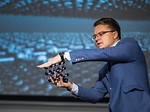
Major Grant Projects
Projects and grants motivate our staff in their academic and scientific achievements and constitute an important part of Palacký University’s funding.
OP Excellence in Research
Sinophone Borderlands – Interactions at the Edges

The project, supported in the Excellence in Research call in the Operational Programme Research, Development and Education, strives for a complex understanding of China. This should be achieved by an analysis of the intersection of neighbour relationships and by consideration of the historic development and geopolitical interests in all given regions. A research centre of excellence is being created for the project, hosting language and computer laboratories for processing large data as well as a material culture lab. The research team is distinctly international and based on partnerships with prestigious institutions abroad, such as the University of Cambridge, George Washington University, Humboldt University of Berlin, the anthropological Musée du quai Branly in Paris, the Russian Academy of Sciences, and other six foreign institutions.
Plants for Sustainable Global Development
The Centre of the Haná Region for Biotechnological and Agricultural Research (CRH), which has been part of the Czech Advanced Technology and Research Institute (CATRIN) of UP since 2020, has succeeded in the Excellence in Research grant call of the Operational Programme Science, Research and Education. With its project entitled Plants as a means of sustainable global development, it was ranked seventh among the top 15 projects. The project was launched in 2018, and over the course of five years, the researchers can count on financial support of CZK 361 million. The money is intended to support research in the field of biotechnology, and will also allow for the acquisition of new instruments, the hiring of scientific reinforcements and collaboration with research institutes abroad.
Nanotechnology for the Future

The project by the Regional Centre of Advanced Technologies and Materials (now under the Czech Advanced Technology and Research Institute - CATRIN) of entitled “Nanotechnology for the Future” from the grant competition “Excellence in Research” in the Operational Programme “Science, Research and Education” is counting on the development of nanotechnologies with major societal impact in the areas of improving the quality of the environment, human health, and renewable energy sources. Scientists will also look into the development of new super-functional materials with unique magnetic, optical, and catalytic properties for application in water treatment, environmental protection, production and storage of hydrogen power, and in biomedicine.
OP Teams of Excellence
Advanced Hybrid Nanostructures for Applications in Renewable Energy Sources

The aim of the project is to contribute to important advancements in the development of technologies that will allow effective splitting of water molecules into hydrogen as a major sustainable source of energy. The development of hybrid nanomaterials using sunlight to split water is now in the hands of a new team of the Czech Advanced Technology and Research Institute led by a world-recognised scientist in the fields of material chemistry, photoelectrochemistry, and renewable energy, Patrik Schmuki. The project will involve researchers from the United States of America, Denmark, Switzerland, France, and South Korea. One group in Olomouc will focus on material research, while another will focus on applications in photoelectrochemistry and renewable energy sources.
OP Pre-application Research for ITI
The Olomouc ARTECA ITI – Agglomeration: Advanced Physical and Chemical Methods in Research and Protection of Cultural Heritage

The aim of the project is to carry out analyses of materials from historical works using physico-chemical methods, applying new procedures and technologies. The objective is to obtain comprehensive information and provide it to art historians who will be able to assess not only the content but also the material aspects of the work. This information will help reveal ancient technical practices in art works and consequently will also enhance the preservation of historical monuments and works of art. This unique way of researching and protecting cultural and artistic heritage will bring together art historians, chemists, and physicists into one research team. The aim of the project is the development of new methods and techniques, but the potential of the project is not limited to scientific research. The results will be transferable into practice; the interconnection of several fields will bring a new perspective and will also be useful for the protection of historical monuments. The partners of the project are the National Heritage Institute and the Olomouc Museum of Art. The project is supported by the Operational Programme Research, Development and Education – Pre-application Research for ITI (Integrated Territorial Investment), which aims to contribute to the development of the Olomouc agglomeration.
Development of Pre-application Research in Nano- and Biotechnologies

The main purpose of this joint project is to boost research into nanotechnologies and biotechnologies in the pre-application stage, i.e. prior to their application in practice. Thanks to a subsidy of €5 million from the Operational Programme “Research, Development and Education – Pre-Application Research for ITI (Integrated Territorial Investment)”, researchers will be able to deal with the development of new technologies that could be used for instance in agriculture, the food industry, environmental protection, and medicine. The results of their research should contribute to the development of the Olomouc conurbation.
More information on the project
Czech Science Foundation EXPRO
Observance Reconsidered: Uses and Abuses of the Reformation (Individuals, Institutions, Society)

The project focuses on the contrasts and parallels between the Catholic Reformation and the early phase of the emerging European Reformation. In the Czech lands and surrounding regions, this task will be performed by making critical editions and analytical studies of published sources. This approach will form the basis for interpretative studies with focus on urban communities and the adoption of general reformation ideas in the local environment. Based on previously unreleased material, the project will show the diverse and often problematic development leading to the Early-Modern division of Western Christianity.
Chief Investigator: Doc. Mgr. Antonín Kalous, M.A., Ph.D., Department of History, Faculty of Arts, Palacký University Olomouc; Co-investigator: Doc. Mgr. Petra Mutlová, M.A., Ph.D., Faculty of Arts, Masaryk University
ERC Consolidator
Two-Dimensional Chemistry aimed at New Graphene Derivatives

Physical chemist Michal Otyepka obtained the first ever grant of the European Research Council for Palacký University Olomouc. Its aim is to understand the chemistry of two-dimensional carbon materials, primarily fluorographene. Resolving this issue is a precondition for developing new graphene-derived materials possessing the desired properties for specific applications in medical imaging procedures, electronics and spin electronics, and energy storage in supercapacitors.
HORIZON 2020
Chinese Intelligent Language Learning (CHILL) - Using Grammar Engineering Models for Automated Error Detection
H2020: Marie Skłodowska-Curie (subprogram Individual Fellowship)
This CHILL project will produce a high-precision error detection computational system for Mandarin Chinese, which diagnoses the linguistic source of grammatical errors, and uses this information to provide corrective feedback to learners. The Action takes advantage of the Applicant’s expertise in computational linguistics & their educational applications and relies on supervisor’s expertise in Chinese syntax. The Action includes an in-depth syntactical analysis and computational implementation of both the structure of Mandarin Noun Phrases and related common errors. The focus will lie on quantification, reference/deixis, cognitive status and modification. The Action will make use of well-grounded data-driven interdisciplinary methodologies, integrating standard methodologies for formal linguistic analysis and methodologies for software development from the field of Computer Science. The supervisor and the Applicant have published together and collaborated successfully in other projects. The beneficiary, the Department of Asian Studies at Palacký University, has an excellent reputation in the field of Asian languages with a strong emphasis on new methods in language teaching. These conditions offer an optimal opportunity to develop and test the results of the proposed Action.
Researcher: De Passos Morgado Da Costa Luis Guilherme, MSCA fellow, The Department of Asian Studies, Faculty of Arts, Palacký University Olomouc
Supervisor: Doc. Joanna Ut-seong Sio, Ph.D., The Department of Asian Studies, Faculty of Arts, Palacký University Olomouc
Advanced hybrid theranostic nanoplatforms for active drug delivery in cancer treatment
The three-year project, with a grant of approximately €750,000, will enable scientists from Palacký University Olomouc, the Consiglio Nazionale delle Ricerche in Italy, and the National University of Ireland Maynooth to build a platform for international collaboration in research into targeted treatment of osteosarcoma, a malignant bone disease. The project will significantly increase their chances of success in upcoming European project calls. The establishment of an international consortium is one of the prerequisites for obtaining large H2020 grants.
The participating institutions are united in their desire to advance research into the treatment of osteosarcoma, the second most common bone cancer and the one that most affects adolescent children. In addition to their own research, the project aims to foster mutual collaboration. Seminars, workshops, and study stays for doctoral students, who will become an important part of the prepared research network, will also contribute to the development of the research cluster.
Project website:
Nano4Tarmed – Advanced hybrid theranostic nanoplatforms for an active drug delivery in the cancer treatment
TRANS.ARCH: Archives in Transition: Collective Memories and Subaltern Uses
Marie Skłodowska-Curie (Research and Innovation Staff Exchange sub-programme)
The aim of the project is to map how new digital technologies and the postmodern collapse of grand narratives, along with the emergence of new theoretical approaches such as postcolonial studies and queer studies, have led to changes in understanding the archive. At the same time, researchers will investigate how different groups of people – from descendants of America’s indigenous peoples and victims of Latin American dictatorships to migrants and sexual minorities – use archives to exercise their rights.
The grant is coordinated by doc. Daniel Nemrava from the Department of Romance Studies at Palacký University Olomouc. The nine partner universities include both European ones (Goethe-Universität Frankfurt am Main, Università degli Studi Roma Tre, Universidad de Sevilla, Universitat de Valencia) and those in Latin America (Universidad Nacional de Tres de Febrero, Universidad Nacional del Litoral, Pontificia Universidad Católica del Perú, Pontificia Universidad Javeriana).
Early Modern Evangelization of China: The Franciscan Mission and its Theory
Marie Skłodowska-Curie (Individual Fellowship sub-programme)
The project is aimed at studying the evangelization strategy of Franciscans in China during the 17th century. The objective is to confront the specific Franciscan concept of piety with the distinctive culture of the Middle Empire and its religious and spiritual traditions.
Investigator: Dr. Mgr. Iveta Nakládalová, the key researcher of “Sinophone Borderlands – Interaction at the Edges”, Department of Romance Studies, Faculty of Arts, Palacký University Olomouc.
Other projects
Advanced hybrid theranostic nanoplatforms for an active drug delivery in the cancer treatment

The three-year project with a grant of approximately CZK 19 million will enable scientists from Palacký University, the Consiglio Nazionale delle Ricerche in Italy and the National University of Ireland Maynooth to build a platform for international collaboration in research on targeted treatment of osteosarcoma, a malignant bone disease, and will significantly increase their chances of success in future European project calls. The formation of an international consortium is one of the conditions for obtaining large H2020 grants. The participating institutions are united in their desire to advance research into the treatment of osteosarcoma, the second most common bone cancer and the one that most affects adolescent children. In addition to its own research, the project aims to foster mutual cooperation. Seminars, workshops and exchange placements for PhD students, who will become an important part of the research network being built, will also contribute to building the research cluster.